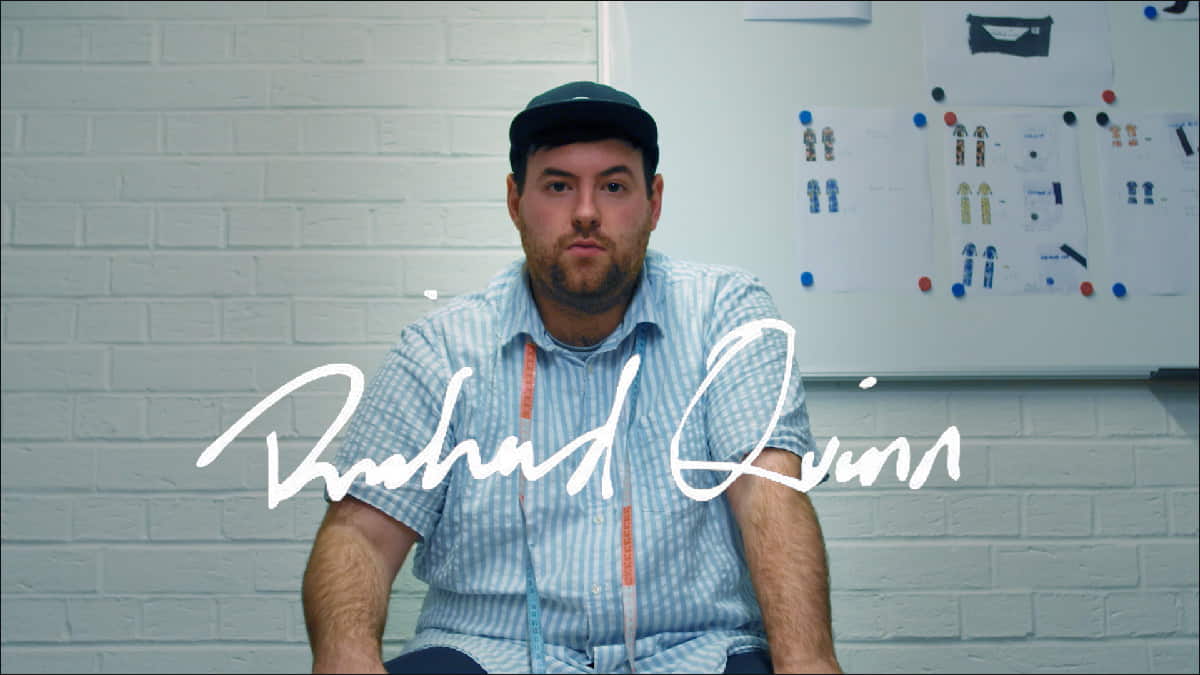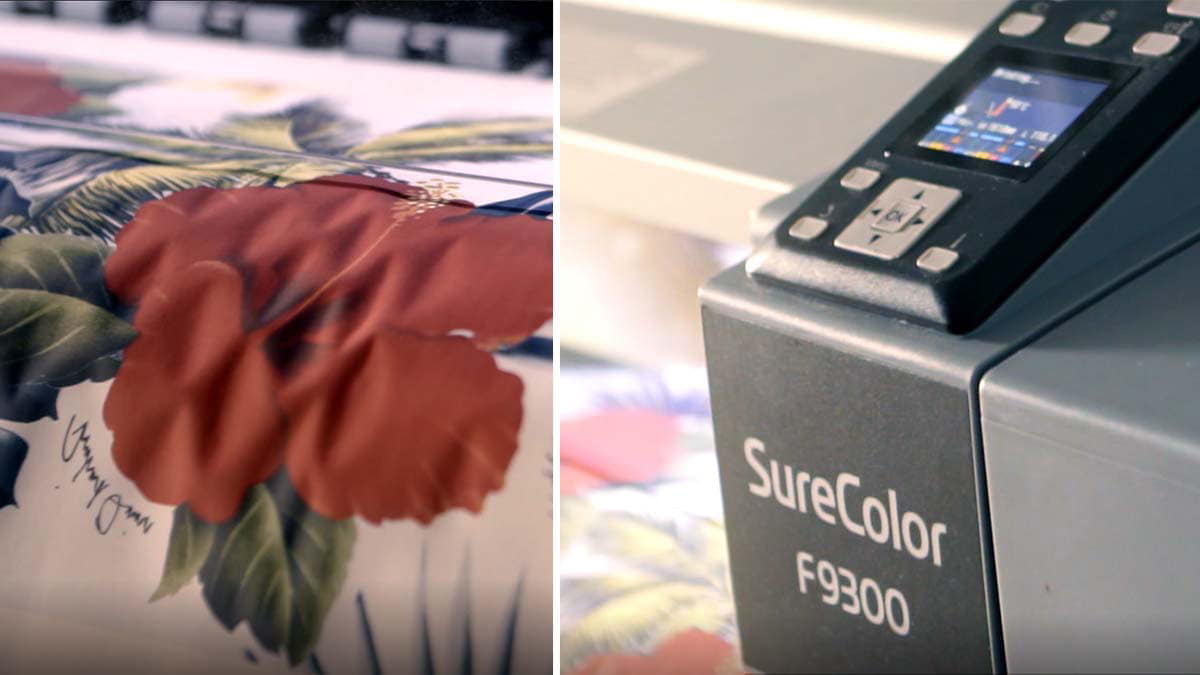Famous Textile and Fashion Designer Richard Quinn achieved high-quality prints on lots of different materials for the Fall-Winter 2021 collection with Epson SureColor SC-F9200 sublimation textile printer and SureColor SC-S80600 signage printer. Quinn, who has been using Epson technology since his student years and his first collection, achieved more successful and faster results in numerous applications in this collection, such as car wrapping, wallpapering, as well as clothes. Furthermore, all printed areas, including the backgrounds in the short promotional film set of the Fall-Winter 2021 collection, were produced with Epson printers.
Quinn has done numerous sublimation works during his fashion master’s degree and decided to invest in his new studio in 2017, aiming to apply his experiences in business life. Quinn said that he preferred Epson because he believed that he could get the best quality printing for the investment and purchased two Epson large-format printers: the SureColor SC-F9200 sublimation textile printer and the SureColor SC-S80600 signage printer. Quinn started to work with different types of polyester and polyester blended fabrics, achieving very successful results. He attracted attention from all over the world after he got his opening award from Queen Elizabeth II at his first fashion show, the Fall-Winter 2018 fashion show at London Fashion Week.

“We wanted to go beyond just making clothes this season”
Richard Quinn stated that this season, they want to challenge themselves with what they could print and how they could apply print to lots of different things and said; “We wanted to go beyond just making clothes”. Quinn noted that they printed car wraps, wallpapers, paintings and various interior decorations for the show, using the SureColor SC-S80600 printer, apart from the SureColor SC-F9200 sublimation textile printer. He disclosed that they print on so many more media and substrates than they ever usually would have thanks to Epson technology. Quinn said that having these machines there for the taking means being able to experiment quickly, to control quality and production under their own roof and added; “With a strict production deadline and things having to be turned around quite fast it was great to see how an idea that started out quite quickly could be turned around in time for the film. It was within two or three days that the printed taxis appeared”.
Quinn stated that they use Epson printers because of the coverage of the fabric they get, the depth of the colours and also the detail in which the shades come out, and remarked that what they see on the screen and all the hand drawings and details that are converted into print quickly become a reality thanks to the Epson printer. Quinn said; “For us cutting down our carbon footprint is of the utmost importance. So, to be able to produce our own collections and all our own fabric in house on the Epson SureColor SC-F9300 and the SureColor SC-F9200 is great” and added that the uniform way in which the Epson printers print the fabric allows them to use it not only for show samples but for production as well. He noted that he has been using Epson technology since his student and first collection and continued; “It is a partnership that keeps moving forward and has grown as our business has grown. We can see how not only the technology has developed but us as a brand and the prints that we use.

Quality prints on different fabrics and surfaces
Epson makes it possible to get high-quality prints on fabrics, clothes and hard surfaces in numerous different fields such as sportswear, t-shirts, casual wear, upholstery, promotional products, fabric signs, accessories. Designed and manufactured 100% by Epson for reliability, effortless performance and low running costs, Epson printers save time and money as well as transferring complex designs down to the finest details onto fabric. UltraChrome DS Ink delivers vibrant prints while superior printhead technology ensures minimal downtime and maximum productivity. Epson offers manufacturers an advantageous option with the quality and services and the total cost of ownership.
Epson supports digitalization and sustainability in textiles
Epson supports digitalization and sustainable production in textile and ready-to-wear printing, offering a wide range of inkjet printers equipped with powerful Micro Piezo technology. Epson Turkey Commercial and Industrial Products Channel Manager Ersel Şamiloğlu pointed out that many experts argue that Industry 4.0 technologies can accelerate the transition to the industrial cycle, and explained Epson’s work in this area as follows:
“Digital technologies helped transfer real-time material and product availability, disposability, accessibility and source data, accelerating the transition of the textile and apparel industries to the circular economy. We can summarize Epson’s contribution to Industry 4.0 technologies as follows; real-time monitoring of machines, real-time productivity calculations, work optimization, digitizing the maintenance and repair work of machines, early detection of errors with digital warning and rapid sample printing, product design development, getting rid of unnecessary stocks, production diversity in unlimited patterns and sizes”.

No-harm printing to human health and environment
Ersel Şamiloğlu stated that Epson aims to eliminate the textile wastes such as chemical-containing inks and liquids in the production of textile products at the pre-consumer design stage and disclosed; “Epson is one of the pioneers of the revolution for digitalization-based solutions and a circular economy in the textile industry with its 100% in-house digital textile printers. Epson meets the expectations of the textile industry 100%, enabling printing with inks that do not adversely affect the environment and have the most vivid colours”.
Epson guarantees a production that is free from harmful chemicals for the environmental awareness and human health, to give confidence that textile products meet international safety standards. Şamiloğlu underlined that the product safety and environmental compliance requirements are determined in the Epson Quality Standard (EQS). He added that Epson aims to reduce CO2 emissions by 90% in all processes of production by 2050 and eliminate greenhouse gas emissions that cause global warming, as well as ensuring and protecting biodiversity as part of the ecosystem.


